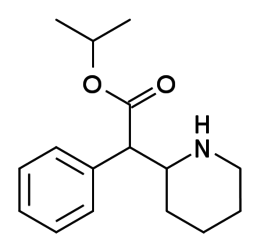Isopropylphenidate
Not to be confused with isopropylphenidine.
 | |
| Legal status | |
|---|---|
| Legal status | |
| Identifiers | |
| |
| CAS Number |
93148-46-0 |
| PubChem (CID) | 68314762 |
| ChemSpider | 48062090 |
| Chemical and physical data | |
| Formula | C16H23NO2 |
| Molar mass | 261.37 g·mol−1 |
| 3D model (Jmol) | Interactive image |
| |
| |
Isopropylphenidate (also known as IPH and IPPD) is a piperidine based stimulant drug, closely related to methylphenidate, but with the methyl ester replaced by an isopropyl ester. It has similar effects to methylphenidate but with a longer duration of action,[1][2] and was banned in the UK as a Temporary Class Drug from April 2015 following its unapproved sale as a designer drug.[3]
See also
References
- ↑ Markowitz JS, Zhu HJ, Patrick KS. Isopropylphenidate: an ester homolog of methylphenidate with sustained and selective dopaminergic activity and reduced drug interaction liability. Journal of Child and Adolescent Psychopharmacology. 2013 Dec;23(10):648-54. doi: 10.1089/cap.2013.0074. PMID 24261661
- ↑ John S. Markowitz; Kennerly S. Patrick; Haojie Zhu (Sep 27, 2012). "Patent US20120245201 - Isopropylphenidate for Treatment of Attention-Deficit/Hyperactivity Disorder and Fatigue-Related Disorders and Conditions". Retrieved 15 August 2014.
- ↑ Methylphenidate-based NPS: A review of the evidence of use and harm. Advisory Council on the Misuse of Drugs, 31 March 2015
This article is issued from Wikipedia - version of the 11/4/2016. The text is available under the Creative Commons Attribution/Share Alike but additional terms may apply for the media files.